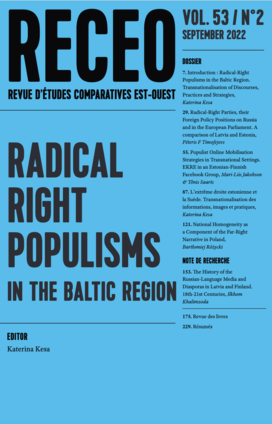
Type de publication et date de parution
RevueRadical Right Populisms in the Baltic Region
Introduction : Radical-Right Populisms in the Baltic Region, Transnationalisation of Discourses, Practices and Strategies
This special issue explores the circulation of ideas, actors and practices between populist radical-right parties in the Baltic region and forms of transnational cooperation among them. It also analyses the perceptions and representations that right-wing activists have of neighboring countries’ policies and their strategies for mobilising diasporic national communities. According to Pēteris F. Timofejevs, the Conservative Estonian People’s Party (EKRE) and the Latvian National Alliance, despite a common hostility towards Russia, have adopted very different foreign policy positions and decisions about electoral and political alliances. Mari-Liis Jakobson and Tõnis Saarts have examined this party’s strategy with regard to the Estonian diaspora in Finland, by using the concept of a “transnational space”, which encompasses the media and social networks. Katerina Kesa has shown how EKRE exploits news and images from Sweden and Finland to promote a xenophobic, ultraconservative ideology in Estonia, while attempting to draw closer to far-right movements in the two aforementioned lands. Focusing on the concept of “national homogeneity” in Poland, Bartłomiej Różycki has inquired into its use by the Law and Justice party (the PiS, in power since 2015). Forged before the World War II and taken up by the communist regime, this concept crops up in both popular initiatives and government rhetoric; it has helped the PiS carry elections.
Introduction : Populismes de droite radicale dans la région baltique
Ce dossier explore la circulation des idées, acteurs et pratiques entre les formations populistes de droite radicale dans l’espace baltique, et leurs formes de coopération transnationale. Il analyse également les perceptions et représentions des politiques des pays voisins par les acteurs de la droite radicale, et leurs stratégies de mobilisation de communautés nationales diasporiques. Pēteris F.Timofejevs montre que le Parti populaire conservateur d’Estonie (EKRE) et l’Alliance nationale lettone, malgré une hostilité commune à l’égard de la Russie, se sont positionnés différemment par rapport à la politique étrangère et aux choix d’alliances électorales et politiques. Mari-Liis Jakobson et Tõnis Saarts explorent la stratégie d’EKRE envers la diaspora estonienne en Finlande, à travers la notion d’« espace transnational », qui associe médias et réseaux sociaux. Katerina Kesa montre comment ce parti instrumentalise informations et images venant de Suède et de Finlande pour promouvoir une idéologie xénophobe et ultra-conservatrice en Estonie, tout en tentant de se rapprocher de l’extrême-droite dans ces deux pays. Bartłomiej Różycki se penche sur le concept d’« homogénéité nationale » en Pologne et son utilisation par le parti Droit et Justice (PiS), au pouvoir depuis 2015. Forgé avant la seconde guerre mondiale, repris par le régime communiste, il apparaît à la fois dans des initiatives populaires et dans la rhétorique gouvernementale, et favorise les succès électoraux du PiS.